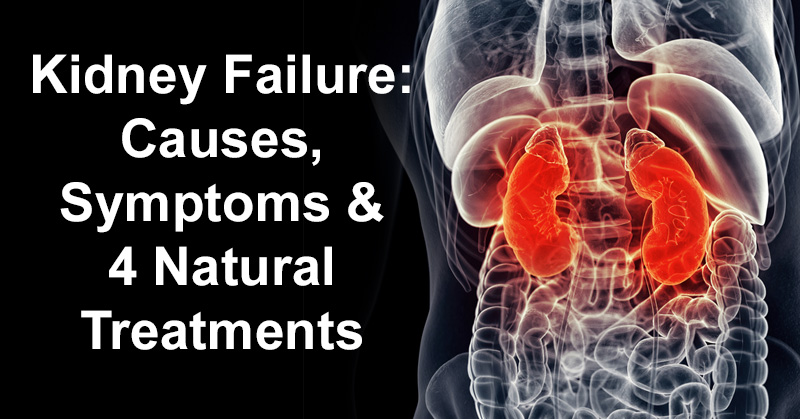When the kidneys stop working well enough to keep you alive, kidney failure occurs. Kidney failure causes include taking certain medications, being overweight or obese and having a history of other health conditions, among other causes and risk factors. (1) While there is no permanent kidney failure treatment, there are natural ways to manage symptoms and prevent kidney failure in the first place.
Kidney Failure Causes and Risk Factors
- Having a history of diabetes, anemia, high blood pressure, heart disease or heart failure
- Suffering from any other form of kidney damage or disease
- Consuming an unhealthy diet
- Being overweight or obese
- Being an older adult
- Having a history of prostate disease, liver damage or liver disease
- Experiencing trauma or an injury to the kidneys that causes sudden blood loss
- Having low immune function due to another illness
- Being treated in a hospital or an intensive care unit
- Taking medications that can lead to kidney problems, such as antibiotics, painkillers, blood pressure drugs or ACE inhibitors

Kidney Failure Symptoms
- Kidney pain, which feels like throbbing or tenderness below the rib cage or in the back or abdomen
- Producing less urine than usual or not at all
- Fluid retention and swelling due to an imbalance of electrolytes, especially in the legs, ankles and feet
- Indigestion, nausea, loss of appetite and vomiting
- High blood pressure
- Cognitive and mood changes, which may include confusion, trouble sleeping, anxiety, fatigue, trouble concentrating, weakness and brain fog
Kidney Failure Treatment
1. Eat a Healthy Diet
Eating a healthy diet is at the top of the list of how to prevent kidney failure naturally. Studies suggest that a poor diet pre diagnosis increases patient morbidity and mortality. A poor diet leads to a weak immune system, which can cause damage to the kidneys and result in many health complications. A kidney-healthy diet should include unprocessed, nutrient-dense foods that are high in antioxidants and electrolytes. (2) Anyone with kidney problems should limit sodium and monitor potassium and phosphorus intake. Foods that support the kidneys include:
- Blueberries
- Cranberries
- Celery
- Leafy greens
- Beets
- Cherries
- Seaweed
- Spinach
- Avocados
- Bananas
- Citrus fruits
- Apples

2. Talk About Your Medications With Your Doctor
Certain medications are considered risk factors for kidney failure. If you are taking medication, talk to your doctor about the possible effects it may have on your kidneys. Medications that can be problematic include antibiotics, painkillers, blood pressure drugs and ACE inhibitors. Limit your use of over-the-counter pain medications, alcohol and tobacco products to help prevent kidney damage from occurring. (3)
3. Use Herbs and Supplements
Certain herbs and supplements may work as kidney failure treatment options. If you suffer from kidney failure, talk to your doctor before taking herbs or supplements. To prevent further damage, supplements that may be helpful include:
- Magnesium: Magnesium can help prevent kidney stones from forming.
- Vitamin B6: Vitamin B6 can help reduce calcium-oxalate levels and support kidney health.
- Vitamin E: Vitamin E is beneficial for lowering calcium-oxalate levels in body to reduce kidney damage.
- Cranberry extract: Cranberry extract may help reduce urinary calcium levels. (4)
- Lemon essential oil and Helichrysum essential oil: Both essential oils can help reduce the risk of kidney stones by helping with liver detoxification. To use lemon essential oil as a kidney failure treatment, place 2 drops of lemon oil in your water twice per day. Rub helichrysum oil topically over your lower abdomen twice per day.

4. Try Dialysis or Other Treatments
Dialysis treatments may be needed for some kidney failure patients to help remove waste, potassium and toxins in their blood. Dialysis works by pumping and cleaning blood, then returning the clean blood back into the patient’s body. In some cases, treatment options may include a kidney transplant. A kidney transplant can come from a relative, friend or stranger who is a match to the patient’s blood type and is willing to donate. (5)


